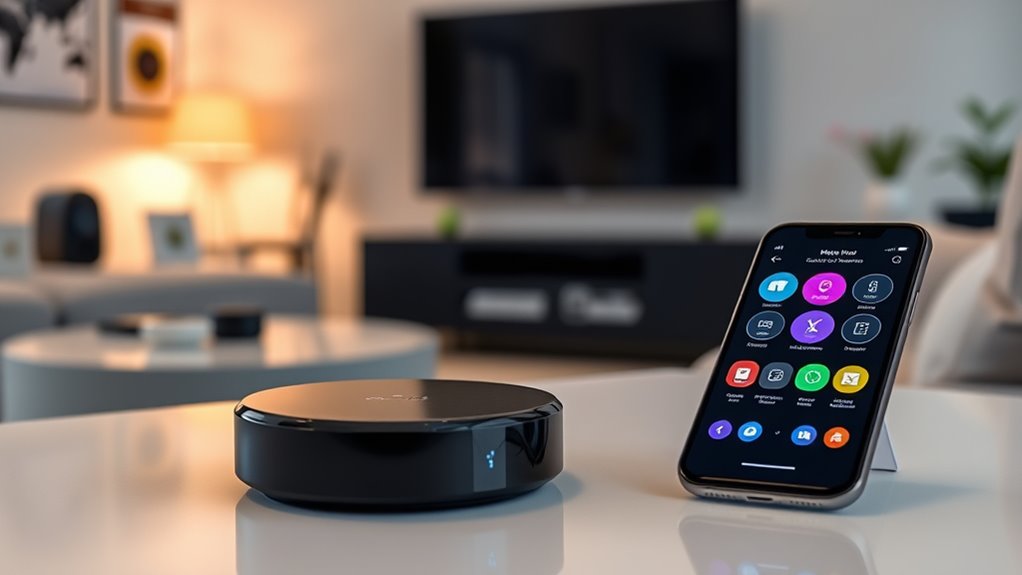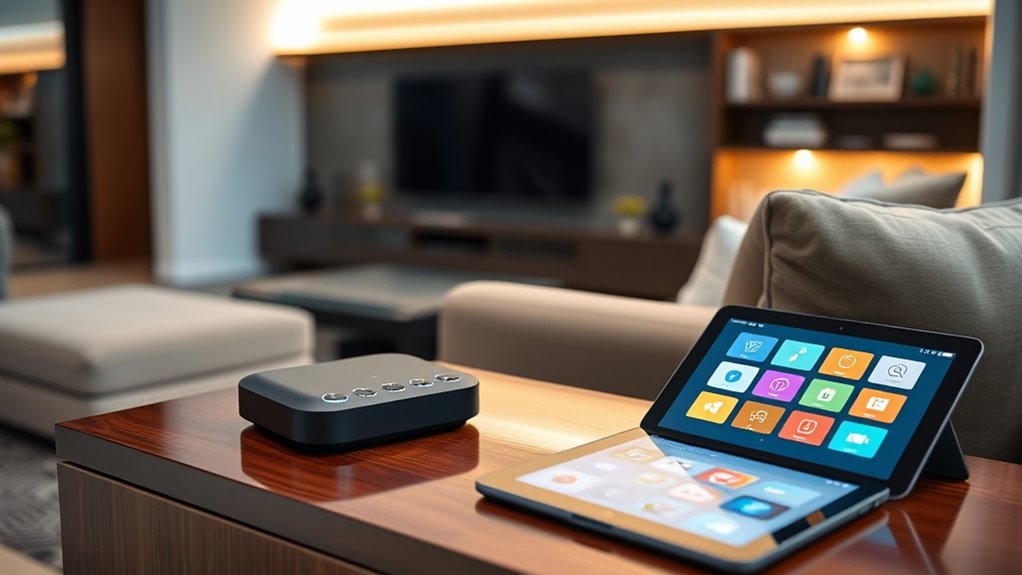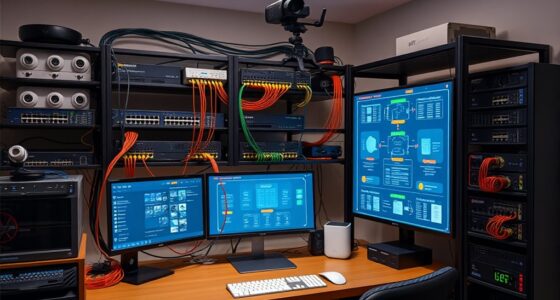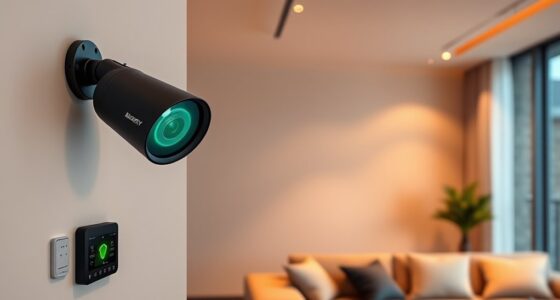A smart home hub can simplify your life by unifying control of various devices and voice assistants through a single interface. It helps you manage lights, thermostats, cameras, and more with ease, often automating routines and schedules. While not always necessary, a hub makes device compatibility smoother and enhances hands-free control. If you want to understand whether a hub fits your needs and how it can improve your smart home experience, keep exploring the options.
Key Takeaways
- A smart home hub centralizes device control, simplifying management across multiple brands and protocols.
- Hubs enable seamless voice assistant integration for hands-free, intuitive device operation.
- They act as a bridge, improving compatibility among diverse smart gadgets and ecosystems.
- Using a hub supports automation, routines, and scheduling for enhanced smart home convenience.
- Not always necessary for basic setups; consider your device variety and automation needs before choosing one.

Smart home hubs and controllers have become essential tools for managing your connected devices seamlessly. They act as the central command center, allowing you to control various smart gadgets through a single interface. Whether you have smart lights, thermostats, security cameras, or entertainment systems, a hub can simplify your setup by bringing everything together. For many, voice assistants play a vital role in this ecosystem. A good hub supports popular voice assistants like Alexa, Google Assistant, or Siri, enabling you to operate your devices with simple voice commands. This integration makes managing your smart home more intuitive and hands-free, especially when you’re busy or your hands are full.
Smart home hubs integrate voice assistants for seamless, hands-free device control and simplified smart home management.
One of the biggest advantages of using a smart home hub is device compatibility. Not all smart devices are designed to work directly with each other or with your preferred voice assistant. A hub acts as a bridge, ensuring these devices can communicate and work in harmony. For example, if you have smart bulbs from one brand and a smart thermostat from another, a hub can unify their control, so you don’t need separate apps or interfaces for each device. This compatibility not only streamlines your smart home experience but also reduces frustration caused by incompatible gadgets.
When shopping for a hub, you’ll want to consider which voice assistants it supports, as that will determine how you interact with your devices. Some hubs are compatible with multiple voice platforms, giving you flexibility in how you control your home. Others may be more specialized, focusing on particular ecosystems. Device compatibility also extends to the types of gadgets the hub can connect with. Most modern hubs support Wi-Fi, Zigbee, or Z-Wave protocols, broadening the range of smart devices you can incorporate into your setup. This flexibility enables you to add new devices over time without worrying about compatibility issues.
Another factor to think about is ease of setup and use. A good hub should be straightforward to install and configure, allowing you to quickly connect your devices and create automations. Many hubs come with companion apps that guide you through the process, making it accessible even if you’re not tech-savvy. Once set up, you’ll appreciate how a hub centralizes control, enabling you to create routines, set schedules, and manage your smart home effortlessly.
Frequently Asked Questions
Can I Use Multiple Hubs in One Smart Home Setup?
Yes, you can use multiple hubs in your smart home setup. This allows for better multi-hub management, especially if you have diverse devices and protocols. Just guarantee your hubs support device interoperability and can communicate effectively with each other. Keep in mind, managing multiple hubs may require some extra setup, but it can enhance your overall smart home experience by expanding compatibility and reducing system bottlenecks.
Are Smart Home Hubs Compatible With All Device Brands?
You might wonder if smart home hubs are compatible with all device brands. The truth is, hub interoperability varies; some hubs support multiple brands, while others are limited. To guarantee your devices work seamlessly, check the device brand compatibility before buying a hub. Opt for a hub known for broad compatibility to avoid frustration, and remember, not all device brands play nicely with every hub, so research thoroughly.
How Secure Are Smart Home Hubs From Hacking?
They say, “Prevention is better than cure,” and that applies to your smart home’s security. Smart home hubs can be vulnerable to hacking due to firmware vulnerabilities and privacy concerns. While they offer convenience, guarantee you keep firmware updated and use strong, unique passwords. Regularly monitoring your network helps prevent unauthorized access, making your smart home less of a target for cyber threats.
Do Smart Home Controllers Require Ongoing Subscription Fees?
You might wonder if smart home controllers require ongoing subscription costs. Many service plans do come with subscription fees for features like remote access, security monitoring, or cloud storage. However, some controllers offer free basic functions, so you can choose whether to pay for extra features. Always check the specific device’s service plans and subscription costs upfront to avoid surprises and select the option that best fits your needs.
Can I Control Smart Devices Remotely Without a Hub?
Imagine having a magic wand at your fingertips. Yes, you can control smart devices remotely without a hub, thanks to voice control and wireless connectivity. Many smart devices now connect directly to your Wi-Fi, letting you manage them via apps or voice commands from anywhere. You don’t need a hub as long as your devices support direct Wi-Fi or Bluetooth connections, making remote control simple and seamless for you.
Conclusion
Whether you need a smart home hub or controller is like choosing a key to your digital kingdom—it’s all about what fits your lifestyle. If you crave simplicity and seamless integration, a hub can be your loyal knight. But if you prefer flexibility, managing devices individually might suit you better. Ultimately, it’s your castle—build it your way. So, do you want a command center or just a collection of gadgets? The choice is yours.










